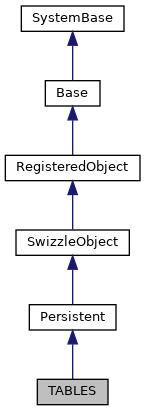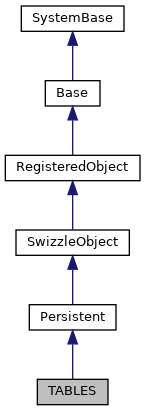Returns one row for each table in the current namespace for which the current user has privileges. More...


Public Attributes | |
| Classname | |
| Name of the class that projected this table. More... | |
| Description | |
| Table's description. More... | |
| ISINSERTABLEINTO | |
| The values of IS_INSERTABLE_INTO have the following meanings: More... | |
| ISSHARDED | |
| More... | |
| ISTYPED | |
| From the standard: More... | |
| Owner | |
| Table's owner. More... | |
| REFERENCEGENERATION | |
| From the Standard: More... | |
| SELFREFERENCINGCOLUMNNAME | |
| From the standard: More... | |
| TABLECATALOG | |
| Table qualifier - always NULL in InterSystems IRIS. More... | |
| TABLENAME | |
| Name of the table. More... | |
| TABLESCHEMA | |
| Name of schema that contains the table. More... | |
| TABLETYPE | |
| The values of TABLE_TYPE have the following meanings: More... | |
| USERDEFINEDTYPECATALOG | |
| From the standard: More... | |
| USERDEFINEDTYPENAME | |
| For InterSystems IRIS, USER_DEFINED_TYPE_NAME is always NULL. More... | |
| USERDEFINEDTYPESCHEMA | |
| For InterSystems IRIS, USER_DEFINED_TYPE_SCHEMA is always NULL. More... | |
Additional Inherited Members | |
 Public Member Functions inherited from Persistent Public Member Functions inherited from Persistent | |
| _.Library.Status | AcquireLock (_.Library.String locktype) |
| Acquires a lock for the current instance. More... | |
| _.Library.Status | LoadData (_.Library.String id) |
| LoadData() - loads an object from storage. More... | |
| _.Library.Status | OnAfterSave (_.Library.Boolean insert) |
| This callback method is invoked by the <METHOD>Save</METHOD> method to. More... | |
| _.Library.Status | OnBeforeSave (_.Library.Boolean insert) |
| This callback method is invoked by the <METHOD>Save</METHOD> method to. More... | |
| _.Library.Status | OnOpen () |
| This callback method is invoked by the <METHOD>Open</METHOD> method to. More... | |
| _.Library.Status | OnReload () |
| This callback method is invoked by the <METHOD>Reload</METHOD> method to. More... | |
| _.Library.Status | OnRollBack () |
| This callback method is invoked by the <METHOD>Save</METHOD> method to. More... | |
| _.Library.Status | ReleaseLock (_.Library.String locktype) |
| Releases a lock for the current instance. More... | |
| _.Library.Status | SaveData (_.Library.String id) |
| SaveData() - saves an object to disk, checks uniqueness and referential More... | |
 Public Member Functions inherited from SwizzleObject Public Member Functions inherited from SwizzleObject | |
| _.Library.Status | OnJournalObject (_.Library.Integer tranid, _.Library.Integer jrnid, _.Library.String filter) |
| This callback method is invoked by the <METHOD>JournalObject</METHOD> method to. More... | |
 Public Member Functions inherited from RegisteredObject Public Member Functions inherited from RegisteredObject | |
| _.Library.Status | OnAddToSaveSet (_.Library.Integer depth, _.Library.Integer insert, _.Library.Integer callcount) |
| This callback method is invoked when the current object is added to the SaveSet,. More... | |
| _.Library.Status | OnClose () |
| This callback method is invoked by the <METHOD>Close</METHOD> method to. More... | |
| _.Library.Status | OnConstructClone (_.Library.RegisteredObject object, _.Library.Boolean deep, _.Library.String cloned) |
| This callback method is invoked by the <METHOD>ConstructClone</METHOD> method to. More... | |
| _.Library.Status | OnNew () |
| This callback method is invoked by the <METHOD>New</METHOD> method to. More... | |
| _.Library.Status | OnValidateObject () |
| This callback method is invoked by the <METHOD>ValidateObject</METHOD> method to. More... | |
 Static Public Member Functions inherited from Persistent Static Public Member Functions inherited from Persistent | |
| _.Library.Status | DeleteData (_.Library.String id, _.Library.Integer concurrency) |
| This method is normally generated by the storage class for persistent classes using. More... | |
| _.Library.Status | KillExtentData (_.Library.Boolean killstreams) |
| KillExtentData() - kills extent data in storage. More... | |
| _.Library.Status | OnAfterBuildIndices (_.Library.String indexlist) |
| This callback method is invoked by the <METHOD>BuildIndices</METHOD> method after all work is completed. More... | |
| _.Library.Status | OnAfterDelete (_.Library.ObjectIdentity oid) |
| This callback method is invoked by the <METHOD>Delete</METHOD> method to. More... | |
| _.Library.Status | OnAfterPurgeIndices (_.Library.String indexlist) |
| This callback method is invoked by the <METHOD>PurgeIndices</METHOD> method after all work is completed. More... | |
| _.Library.Status | OnBeforeBuildIndices (_.Library.String indexlist) |
| _.Library.Status | OnBeforePurgeIndices (_.Library.String indexlist) |
| _.Library.Status | OnDelete (_.Library.ObjectIdentity oid) |
| This callback method is invoked by the <METHOD>Delete</METHOD> method to. More... | |
 Static Public Attributes inherited from Persistent Static Public Attributes inherited from Persistent | |
| XCOMPACTANCESTRY | |
| XCOMPACTANCESTRY can be set to a string to replace the value of the %CLASSNAME property (x__classname field) More... | |
| DATALOCATIONGLOBAL = None | |
| Global name containing master map data for this class. More... | |
| DEFAULTGLOBAL = None | |
| DSCONDITION = None | |
| DSCONDITION is the expression that will be evaluated before deciding whether certain actions must be taken. More... | |
| DSINTERVAL = None | |
| DSINTERVAL is the number of seconds between one DSTIME value and the next. More... | |
| DSTIME = None | |
| If the DSTIME parameter is set to AUTO then the most recent filing operation in the current DSTIME value. More... | |
| EXTENTQUERYSPEC = None | |
| The EXTENTQUERYSPEC parameter defines the properties to be retrieved in. More... | |
| EXTENTSIZE = None | |
| The EXTENTSIZE parameter is used to inform the SQL Query Optimizer More... | |
| GUIDENABLED = None | |
| If this parameter is set to 1 then a GUID will be assigned (to the GUID property) to each new object. More... | |
| IDENTIFIEDBY = None | |
| The IDENTIFIEDBY parameter can optionally be set to the name. More... | |
| MANAGEDEXTENT = None | |
| The MANAGEDEXTENT parameter can be set to 0 (zero) to cause the Extent Manager. More... | |
| READONLY = None | |
| READONLY = 1 means that objects can be created, opened but not saved or deleted. More... | |
| ROWLEVELSECURITY = None | |
| ROWLEVELSECURITY = 1 | <property> means that row level security is active and the list More... | |
| SQLPREVENTFULLSCAN = None | |
| SQLPREVENTFULLSCAN = 1 means an attempt to prepare a query that will result in a full scan More... | |
| STORAGEDEFAULT = None | |
| STORAGEDEFAULT defines the default storage allocation to use for properties in this class. More... | |
| USEEXTENTSET = None | |
| VERSIONCLIENTNAME = None | |
| VERSIONCLIENTNAME can be set to a valid CLIENTNAME (see property CLIENTNAME) value. More... | |
| VERSIONPROPERTY = None | |
| VERSIONPROPERTY = <property> means that the <property> in memory will be compared to. More... | |
 Static Public Attributes inherited from SwizzleObject Static Public Attributes inherited from SwizzleObject | |
| DEFAULTCONCURRENCY = None | |
| DEFAULTCONCURRENCY is the default value for the concurrency formal argument. More... | |
| JOURNALSTREAM = None | |
| If OBJJOURNAL is true then the value of the JOURNALSTREAM parameter defines whether or not. More... | |
| OBJJOURNAL = None | |
| if OBJJOURNAL is TRUE then inserts, updates and deletes will be logged in ^OBJ.JournalT More... | |
 Static Public Attributes inherited from RegisteredObject Static Public Attributes inherited from RegisteredObject | |
| CAPTION = None | |
| Optional name used by the Form Wizard for a class when generating forms. More... | |
| JAVATYPE = None | |
| The Java type to be used when exported. | |
| PROPERTYVALIDATION = None | |
| This parameter controls the default validation behavior for the object. More... | |
Returns one row for each table in the current namespace for which the current user has privileges.
| Classname |
Name of the class that projected this table.
| Description |
Table's description.
| ISINSERTABLEINTO |
The values of IS_INSERTABLE_INTO have the following meanings:
| ISSHARDED |
| ISTYPED |
From the standard:
A table RT whose row type is derived from a structured type ST is called a typed table. Only a base table or a view can be a typed table.
A typed table has columns corresponding, in name and declared type, to every attribute of ST and one other column REFC that is the self-referencing column of RT;
let REFCN be the <column name> of REFC. The declared type of REFC is necessarily REF(ST) and the nullability characteristic of REFC is known not nullable.
If RT is a base table, then the table constraint "UNIQUE(REFCN)" is implicit in the definition of RT. A typed table is called a referenceable table.
A self-referencing column cannot be updated. Its value is determined during the insertion of a row into the referenceable table.
The value of a system-generated self-referencing column and a derived self-referencing column is automatically generated when the row is inserted into the referenceable table.
The value of a user-generated self-referencing column is supplied as part of the candidate row to be inserted into the referenceable table.</i
InterSystems IRIS does not currently support typed tables, therefore IS_TYPED is always NO.
| Owner |
Table's owner.
| REFERENCEGENERATION |
From the Standard:
The values of REFERENCE_GENERATION have the following meanings:
SYSTEM GENERATED - The values of the self-referencing column of the table are generated by the SQL-server.
USER GENERATED - The values of the self-referencing column of the table are generated by the user.
DERIVED - The values of the self-referencing column of the table are generated from columns of the table.
null - The table being described does not have a self-referencing column.</i
Since InterSystems IRIS does not support self-referencing columns, REFERENCE_GENERATION is always null.
| SELFREFERENCINGCOLUMNNAME |
From the standard:
The value of SELF_REFERENCING_COLUMN_NAME is the name of the self-referencing column of the table, if the table is a typed table.
Otherwise, the value of SELF_REFERENCING_COLUMN_NAME is the null value.</i
Since InterSystems IRIS does not currently support typed table (see IS_TYPED), SELF_REFERENCING_COLUMN_NAME is always NULL
| TABLECATALOG |
Table qualifier - always NULL in InterSystems IRIS.
| TABLENAME |
Name of the table.
| TABLESCHEMA |
Name of schema that contains the table.
| TABLETYPE |
The values of TABLE_TYPE have the following meanings:
| USERDEFINEDTYPECATALOG |
From the standard:
If the table being described is a table of a structured type TY, then the values of USER_DEFINED_TYPE_CATALOG, USER_DEFINED_TYPE_SCHEMA, and USER_DEFINED_TYPE_NAME
are the fully qualified name of TY; otherwise, the values of USER_DEFINED_TYPE_CATALOG, USER_DEFINED_TYPE_SCHEMA, and USER_DEFINED_TYPE_NAME are the null value.</i
For InterSystems IRIS, USER_DEFINED_TYPE_CATALOG is always NULL.
| USERDEFINEDTYPENAME |
For InterSystems IRIS, USER_DEFINED_TYPE_NAME is always NULL.
| USERDEFINEDTYPESCHEMA |
For InterSystems IRIS, USER_DEFINED_TYPE_SCHEMA is always NULL.